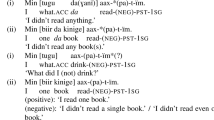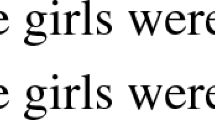Abstract
This paper investigates the effects of (surface) DP-internal quantifying expressions on semantic interpretation. In particular, I investigate two syntactic constructions in which an adjective takes scope out of its embedding DP, thus raising an interesting question for strict compositionality. Regarding the first construction, I follow Larson (1999) and assume that the adjective incorporates into the determiner of its DP, forming a complex quantifier [D+A]. I present new evidence in favor of this analysis. Since Larson's semantic analysis of complex quantifiers [D+A] makes a wrong prediction, I propose an alternative, empirically more adequate analysis that treats D+A compounds as pluractional quantifiers in the sense of Lasersohn (1995). Finally, I turn to the second construction, arguing that – despite superficial similarities to the first construction - it should not be analyzed in terms of complex quantifier formation, but in terms of LF-movement of the adjective to Spec,DP. The discussion suggests that there is more than one way for DP-internal modifiers to take DP-external scope in natural language.
Similar content being viewed by others
References
Barwise, J. and R. Cooper: 1981, 'Generalized Quantifiers and Natural Language', Linguistics and Philosophy 4, 159–219.
Bolinger, D.: 1967, 'Adjectives in English: Attribution and Predication', Lingua 18, 1–34.
Brisson, C.: 1998, Distributivity, Maximality, and Floating Quantifiers, PhD dissertation, Rutgers University.
Chierchia, G.: 1998, 'Plurality of Mass Nouns and the Notion of “Semantic Parameter”', in S. Rothstein (ed.), Events in Grammar, pp. 53–103. Kluwer, Dordrecht.
Chomsky, N.: 1995, The Minimalist Program. MIT Press, Cambridge, Mass.
Davidson, D.: 1967, 'The Logical Form of Action Sentences', in N. Rescher (ed.), The Logic of Decision and Action, pp. 81–95. University of Pittsburgh Press, Pittsburgh.
Dekker, P.: 1997, 'Cases, Adverbs, Situations and Events', in H. Kamp and B. Partee (eds.), Proceedings of the Workshop on Context Dependence, IMS, University of Stuttgart.
Diesing, M.: 1992, Indefinites. MIT Press, Cambridge, Mass.
Doetjes, J.: 1997, Quantifiers and Selection. On the Distribution of Quantifying Expressions in French, Dutch and English. Holland Academic Graphics, The Hague.
Doetjes, J. and M. Honcoop: 1997, 'The Semantics of Event-related Readings: A Case for Pair-Quantification', in A. Szabolcsi (ed.), Ways of Scope Taking, pp. 263–310. Kluwer, Dordrecht.
Fiengo, R. and J. Higginbotham: 1981, 'Opacity in NP', Linguistic Analysis 7, 395–421.
von Fintel: 1994, Restrictions on Quantifier Domains, PhD dissertation, University of Massachussetts, Amherst.
Frey, W.: 1993, Syntaktische Bedingungen für die semantische Interpretation. Ñber Bindung, implizite Argumente und Skopus. Akademie Verlag, Berlin.
Fukui, N.: 1986, A Theory of Category Projection and Its Applications. PhD dissertation, MIT, Cambridge, Mass.
Gil, D.: 1995, 'Universal Quantifiers and Distributivity', in E. Bach et al. (eds.), Quantification in Natural Languages, pp. 321–362. Kluwer, Dordrecht.
Hakulinen, A. and F. Karlsson: 1979, Nykysuomen Lauseoppi. Suomalaisen Kirljallisuuden Seura, Helsinki.
Haspelmath, M.: 1995, 'Diachronic Sources of “All” and “Every”', E. Bach et al. (eds.), Quantification in Natural Languages, pp. 363–382. Kluwer, Dordrecht.
Heim, I.: 1982, The Semantics of Definite and Indefinite Noun Phrases, PhD dissertation, University of Massachusetts, Amherst.
Heim, I.: 1990, 'E-type Pronouns and Donkey Anaphora', Linguistics and Philosophy 13, 137–177.
Heim, I. and A. Kratzer: 1998, Semantics in Generative Grammar. Blackwell, Oxford.
de Hoop, H.: 1995, 'On the Characterization of the Weak-Strong Distinction', in E. Bach et al. (eds.), Quantification in Natural Languages, pp. 421–450. Kluwer, Dordrecht/Boston.
Huang, C.-T. J.: 1982, Logical Relations in Chinese and the Theory of Grammar, PhD dissertation, MIT, Cambridge, Mass.
Kamp, H.: 1981, 'A Theory of Truth and Semantic Interpretation', in J. Groenendijk et al. (eds.), Truth, Interpretation and Information, pp. 1-41. Foris, Dordrecht.
R. Kayne: 1994, The Antisymmetry of Syntax. MIT Press, Cambridge, Mass.
docs/ Console2000pdfs/kaiser.pdf
Kiparsky, P.: 1998, 'Partitive Case and Aspect', in M. Butt and W. Geuder (eds.), The Projection of Arguments: Lexical and Compositional Factors. CSLI, Stanford.
Kitagawa, Y.: 1986, 'More on Bracketing Paradoxes', Linguistic Inquiry, 177–183.
Kratzer, A.: 1995, 'Stage-Level & Individual-Level Predicates', G. Carlson and F. Pelletier (eds.), The Generic Book, pp. 125–175. University of Chicago Press, Chicago.
Kratzer, A.: 1998, 'Scope or Pseudo-Scope? Are There Wide-Scope Indefinites?', in S. Rothstein (ed.), Events in Grammar, pp. 163–196. Kluwer, Dordrecht.
Krifka, M.: 1990, 'Four Thousand Ships Passed through the Lock', Linguistics & Philosophy 13, 487–520.
Krifka, M.: 1998, 'Scope Inversion under the Rise-Fall Contour in German', Linguistic Inquiry, 75–109.
Larson, R. K.: 1999, 'Semantics of Adjectival Modification', LOT Winterschool Class Notes, Amsterdam.
Larson, R. K., M. den Dikken and P. Ludlow: 1997, 'Intensional Transitive Verbs and Abstract Clausal Complementation', ms., CUNY and Stony Brook University.
Lasersohn, P.: 1995, Plurality, Conjunction and Events, Kluwer, Dordrecht.
Leiss, E.: 2000, Artikel und Aspekt. Die grammatischen Muster von Definitheit. deGruyter, Berlin.
Lewis, D.: 1975, 'Adverbs of Quantification', in E. Keenan (ed.), Formal Semantics of Natural Language, pp. 3–15. Cambridge University Press, Cambridge.
Link, G.: 1997, 'Ten Years of Research on Plurals - Where Do We Stand?', in F. Hamm and E. Hinrichs (eds.), Plurality and Quantification, pp. 19–54. Kluwer, Dordrecht.
Link, G.: 1998, '“Je drei Äpfel - Three Apples Each”: Quantification and the German “je”', in G. Link (ed.), Algebraic Semantics in Language and Philosophy, pp. 117–132. CSLI Publications, Stanford.
Matthewson, L.: 1998, Determiner Systems and Quantificational Strategies. Evidence from Salish. Holland Academic Graphics, The Hague.
Matthewson, L.: 2001, 'Quantification and the Nature of Crosslinguistic Variation', Natural Language Semantics 9, 145–189.
Milsark, G.: 1977, 'Toward an Explanation of Certain Peculiarities of the Existential Construction in English', Linguistic Analysis 3, 1–29.
Moltmann, F.: 1992, 'Reciprocals and Same/Different. Towards a Semantic Analysis', Linguistics and Philosophy 15, 411–462.
Moltmann, F.: 1997, Parts and Wholes in Semantics. Oxford University Press, Oxford.
Montague, R.: 1973, 'The Proper Treatment of Quantification in Ordinary English', in K. J. J. Hintikka et al. (eds.), Approaches to Natural Language, pp. 221–242. Reidel, Dordrecht.
Neale, S.: 1990, Descriptions. MIT Press, Cambridge, Mass.
Pafel, J.: 1993, 'Scope and Word Order', in J. Jacobs et al. (eds.), Syntax. An International Handbook of Contemporary Research, Vol. 1, pp. 867–880. de Gruyter, Berlin.
Pafel, J.: 1994, 'Zur syntaktischen Struktur nominaler Quantoren', Zeitschrift für Sprachwissenschaft 13, 236–275.
Parsons, T.: 1990, Events in the Semantics of English. A Study of Subatomic Semantics. MIT Press, Cambridge, Mass.
Partee, B.: 1989, 'Many Quantifiers', in J. Powers and K. de Jong (eds.), '88. Linguistics Department, Ohio State University, Columbus.
Reinhart, T.: 1997, 'Quantifier Scope: How Labor is Divided between QR and Choice-Functions', Linguistics and Philosophy 20, 335–397.
Rizzi, L.: 1990, Relativized Minimality. MIT Press, Cambridge, Mass.
Ross, J. R.: 1967, 'Constraints on Variables in Syntax', PhD dissertation, MIT.
Russell, B.: 1905, 'On Denoting', Mind 14, 479–493.
Sæbø, K. J.: 1995, 'Quantifiers: Configurations and Interpretations', in F. Hamm, J. Kalb and A. v. Stechow (eds.), The Blaubeuren Papers. Proceedings of the Workshop on Recent Developments in the Theory of Natural Language Semantics, vol. 2, pp. 347–378. Seminar für Sprachwissenschaft, Tübingen.
Schwarzschild, R.: 1992, 'Distinguishing Oriented-Adverbials from Secondary Predicates in the Analysis of Together', talk presented at IATL 1992, Bar-Ilan University.
Sharvy, R.: 1980, 'A More General Theory of Definite Descriptions', The Philosophical Review 89, 607–624.
Sportiche, D.: 1990, 'Movement, Agreement, and Case', ms., UCLA.
Strawson, P. F.: 1950, 'On Referring', Mind 59, 320–344.
Stump, G.: 1981, 'The Interpretation of Frequency Adjectives', Linguistics and Philosophy 5, 221–256.
de Swart, H.: 1991, Adverbs and Quantification: A Generalized Approach, PhD dissertation, University of Groningen.
Travis, L.: 1984, Parameters and Effects of Word Order Variation, PhD dissertation, MIT.
Zimmermann, M.: 2002, Boys Buying Two Sausages Each. On the Syntax and Semantics of Distance-Distributivity, PhD dissertation, LOT, Utrecht.
Author information
Authors and Affiliations
Rights and permissions
About this article
Cite this article
Zimmermann, M. Pluractionality and Complex Quantifier Formation. Natural Language Semantics 11, 249–287 (2003). https://doi.org/10.1023/A:1024937316555
Issue Date:
DOI: https://doi.org/10.1023/A:1024937316555




